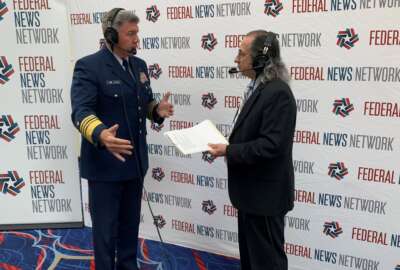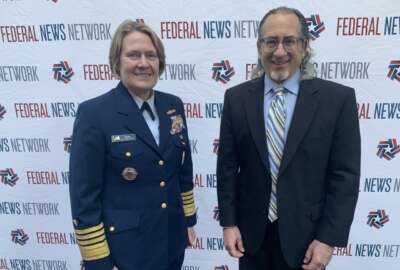The Coast Guard commandant-nominee on the arctic and bumping into the Russians
Vice Commandant Admiral Linda Fagan has been tapped by the White House to succeed Commandant Karl Schultz, who retires in June. She talks about her experiences in...
Best listening experience is on Chrome, Firefox or Safari. Subscribe to Federal Drive’s daily audio interviews on Apple Podcasts or PodcastOne.
She’s had assignments all over the world and ashore for the Coast Guard. Now Vice Commandant Admiral Linda Fagan has been tapped by the White House to succeed Commandant Karl Schultz, who retires in June. Shortly before that announcement, Federal Drive with Tom Temin caught up with Fagan at the Sea Air Space conference.
Interview transcript:
Linda Fagan: I’ve been in uniform now, over 37 years, my first assignment was on the Coast Guard Cutter Polar Star. So I’ve had an opportunity firsthand to visit the Arctic on a ship. I have also been to Antarctica. And I would say change is afoot in the Arctic. And the pace of change continues to accelerate, there’s considerably more water and less ice. And with that alot of just changing patterns of behavior, increase opportunities for people to access the Arctic, whether it’s cruise ships, or some of the desire for resource extraction up there, the people who live in the North Slope there, and they’re seeing impacts for their, you know, subsistence living and some of the challenges to what it takes to live and thrive and survive there.
Tom Temin: Sure. And I imagine the cruise business has fallen off in the last couple of years because of COVID. Is that kind of a relief to the Coast Guard? Because everything else you got to worry about, like Russia and climate change, and icebreaking, cruise ships, I would think would be “Oh, do we have to do this?”
Linda Fagan: Yeah, so definitely the last two years, the cruise industry was impacted by COVID pretty substantially. We were on an upward trajectory before COVID I think it will return and continue to move forward. And, so for the Coast Guard, right, that brings with it increased risk to human lives. Our search and rescue mission is there now and will continue to grow as you see increased access into the Arctic, and then ensuring our role in environmental protection and with the risk to oil spills and otherwise. And we are excited about the polar security cutters, that Halter is building for us. And when we get those into the fleet, it will be just really game changing for the nation.
Tom Temin: Right. You got the polar security cutters and that’s a separate program from the icebreakers, correct?
Linda Fagan: Yeah. So right now the Coast Guard operates icebreakers on behalf of the nation. We have one heavy icebreaker, the Polar Star, they shared my first unit, and their medium icebreaker, the Healy. Healy does quite a bit of scientific research. She basically circumnavigated the continent this past summer, a lot of science and science support. We had Canadians and Danish on board. And then she sailed through the Northwest Passage, around, couple of port calls on the East Coast through the Panama Canal, and then back home to Healy. So that’s, currently, the polar security cutter are the new heavy icebreakers that we’ve got a joint program office with the Navy and will operate those ships and when they’re put into commission.
Tom Temin: And then when it comes to monitoring conditions, like how much ice or water temperatures or any other environmental conditions that affect at sea operations, how does the Coast Guard monitor that? Do you have your own facilities? The a shared naval sensing, do you use NOAA? How does that all work?
Linda Fagan: Yeah, so it’s definitely a team effort. I mean, Healy did quite a bit this past summer, to help measure some of the salinity and just different aspects of the water and water column. And then, you know, obviously, work with NOAA and otherwise, to just continue to learn what we can about the environment up there. And as I said, the pace of change is definitely accelerated. And so we’ll continue to work collaboratively in that regard.
Tom Temin: And of course, I didn’t want to let this go without asking about Russia, because they have the most coastline in the Arctic. And they probably think they own it. And so what you’re seeing there, what are the sensors saying that they’re doing up there while they’re engaged in some of the warmer areas a little bit to the south?
Linda Fagan: Right. And so, you know, the Russians have been investing heavily in their side of the Arctic. But it is important to note, we, too, are an Arctic nation. Alaska is our Arctic presence. And so you know, ensuring and again, this is why the polar security cutters are going to be so pivotal, they will allow us to create a more enduring on the water presence in the Arctic, so that we can enforce our own national sovereignty and our own interest in our EEZ as it pertains to the Arctic. The Russians are obviously operating up there as well. Just a couple of winters ago, we had an opportunity. With COVID, the McMurdo mission was postponed. And so Polar Star was able to sail to the Arctic, as opposed to Antarctica, and, you know, up along our maritime boundary line that we share with the Russians and had opportunity to interact with Russian counterparts. It was all professional, but good to be able to project that presence in a time of year that we weren’t typically in the Arctic.
Tom Temin: Right. So in that region, if one of our cutters passes one of theirs, it’s not like enemies passing but it’s like just two nations.
Linda Fagan: It’s two nations interacting professionally, you know, engaged in how maritime navies and coast guards professionally interact with each other. There was quite a bit of communicating and querying back and forth, it was all professional and nothing belligerent or unexpected.
Tom Temin: Now you mentioned earlier 37 years in the Coast Guard. In uniform. And the Coast Guard has been dealing with allegations and actual incidents of sexual harassment, sexual assault in a few cases, how does that fall to your lap as the vice commandant and also a female officer?
Linda Fagan: We have done a lot over the last seven-plus years to address sexual assault, sexual harassment, in line with our other military services with regard to anytime a survivor comes forward and reports a sexual assault with the seriousness that it is investigated and followed through the survivor support, all of that has changed in some really positive and impactful ways. But there is still work to do. And we continue to look at opportunities for preventing sexual assaults from occurring. Ideally, there would be zero, but that is ongoing work because sexual assault is a crime and it’s investigated, and when found substantiated, it’s punished as a crime.
Tom Temin: All right, and also from we’ve talked a lot about the Arctic. That’s not the only part of your portfolio as vice commandant. How do you divide the duties?
Linda Fagan: So the coastguard organizational structure, we have three star operational commanders, one in San Francisco, which was the position I was in before coming in as the vice and the other one, the Atlantic area commander here on the East Coast and in Portsmouth, and so they really run the day-to-day operations. As the vice commandant, I’m very involved with our acquisitions program. We’re in the midst of the largest acquisition process that we’ve had as an organization since World War II. And then really focus on the internal headquarters workings to make sure that we’re with the resource advocacy, policy, training, all the pieces that it takes to then allow those operational commanders to operate is really what I spend most of my time doing.
Tom Temin: Sounds like you’re optimistic about the guard.
Linda Fagan: Oh, I’m very optimistic. It’s a great time to be in the service. You know, just like the pace of change. Climate change in the Arctic is changing, same for us and it’s nothing but but goodness and opportunity for the service.
Tom Temin: Coast Guard Vice Commandant, Admiral Linda Fagan, who was subsequently nominated to become the next commandant. I spoke with her at the Sea Air Space conference earlier this week at National Harbor.
Copyright © 2025 Federal News Network. All rights reserved. This website is not intended for users located within the European Economic Area.
Tom Temin is host of the Federal Drive and has been providing insight on federal technology and management issues for more than 30 years.
Follow @tteminWFED







